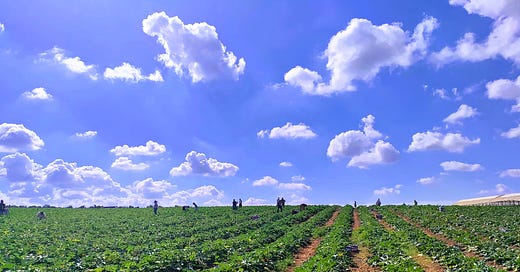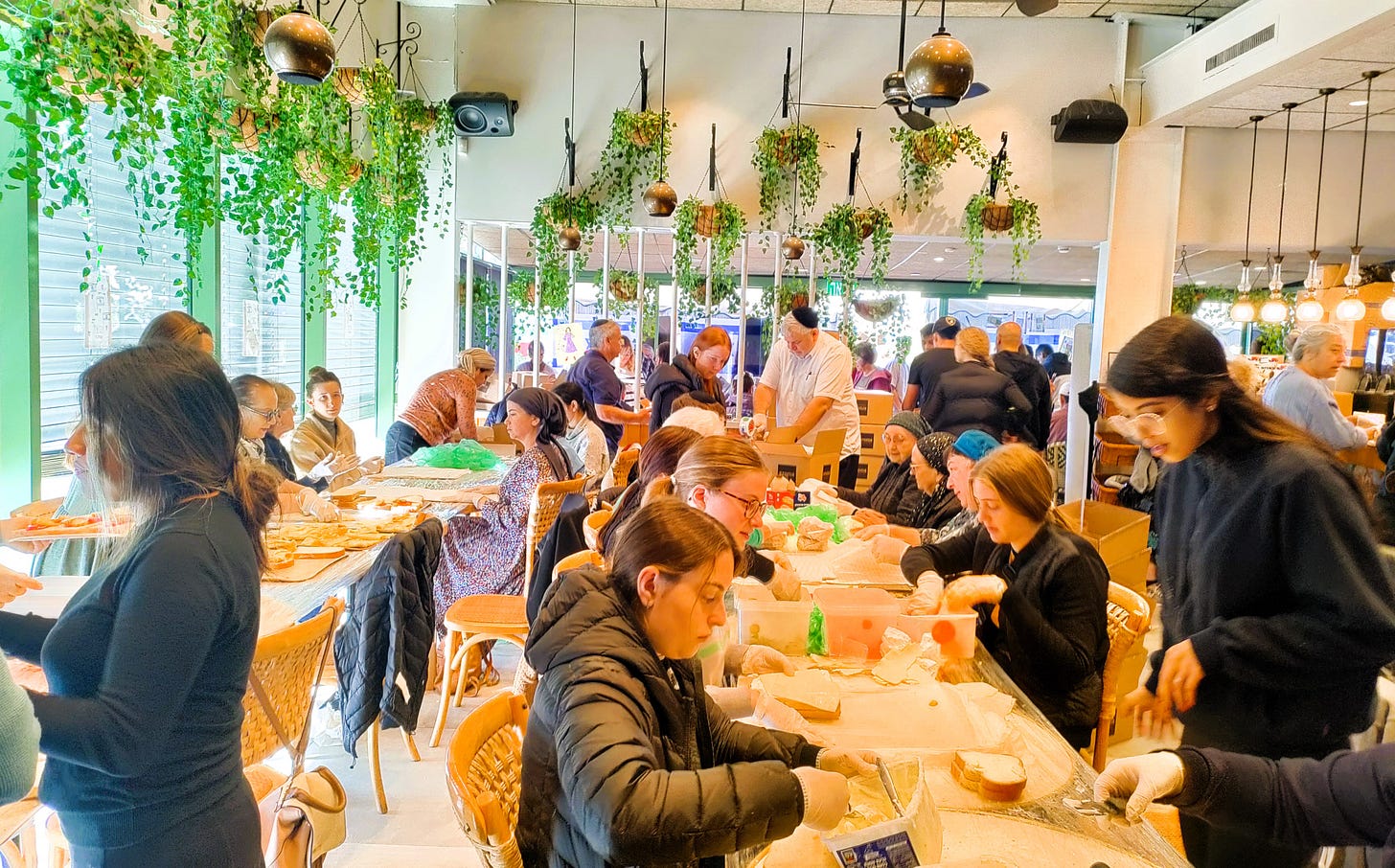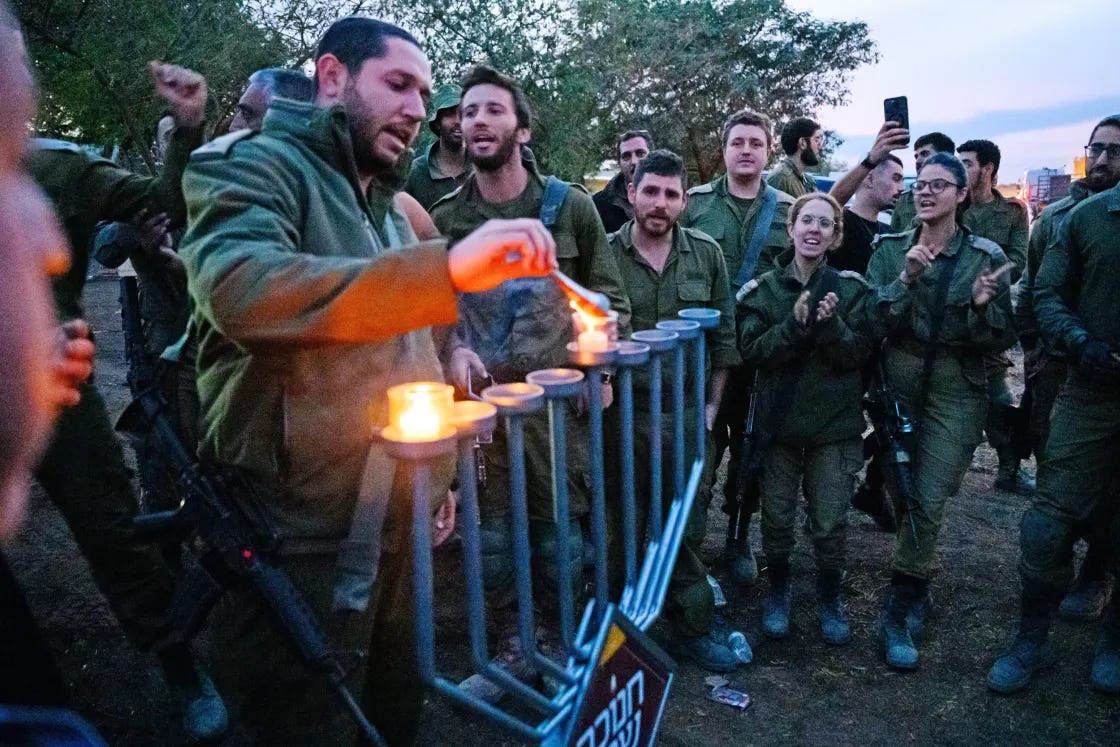When day comes we step out of the shade,
aflame and unafraid
The new dawn blooms as we free it
For there is always light,
if only we’re brave enough to see it
If only we’re brave enough to be it—From The Hill We Climb by Amanda Gorman
This being Chanukah, I’ve been thinking about light. Light as a symbol of goodness, grace, and hope across cultures, throughout time. Light as a metaphor for victory over darkness in the great literary epics. Light as an urgent need in post-October 7th Israel, where we are defending ourselves against a “resistance movement” that explicitly calls for our genocide, our country’s obliteration, and the rejection of all peace initiatives. (If you are unclear about Hamas’ ambitions, read its charter.)
In the first, dark weeks after October 7th, we Israelis channeled our anxiety into frenetic volunteerism, throwing off high-intensity, multifaceted light like spinning disco balls. We raced to farms to pick fruit and vegetables left unattended by foreign workers, mostly from Thailand, who had fled the country. Social workers and psychologists flocked to hotels housing the country’s 200,000 evacuees to help them begin to unravel their trauma. Women pumped breastmilk for babies whose mothers had been murdered or kidnapped. In one month, 60,000 Israelis donated blood, often waiting in line for hours to do so. There was even a canine blood drive for the army’s four-legged fighters injured while sniffing out explosives in Hamas’ tunnels. (Unfortunately, our little Coco did not meet the minimum weight requirement.)
In a spectacular flash, the organizations that had been coordinating the weekly protests against the government’s judicial overhaul plan directed their networking know-how into rescuing families from the terror in the south. A few weeks later, their efforts morphed into a civilian operations center to meet the challenges facing Israel’s bereaved, displaced, and evacuated families. With the innovative spirit that earned Israel its “Start-Up Nation” nickname, 15,000 volunteers found accommodations, provided transportation, offered children’s activities, rescued pets, and delivered food, clothing, and medicine.
Ultra-Orthodox Israelis, who generally choose to separate themselves from mainstream Israeli life, made their own contributions. Members of the primarily ultra-Orthodox Zaka organization performed the horrific but holy work of collecting the remains of the dead. Other ultra-Orthodox organizations cooked meals for evacuees, conducted funerals, and assisted families with shiva, the weeklong mourning period following a Jewish burial.
With the government preoccupied with military operations, and inexcusably slow in responding to the country’s surging social needs, ordinary citizens created a luminous burst of generosity.
As the weeks became months, we focused our light. We became better organized and more efficient. Facebook and WhatsApp groups like “Call-up for Agriculture” and “For Southern Communities with Love” popped up with daily posts that consolidated emerging needs. Volunteers settled into routines, committing themselves to specific days of the week or particular causes.
Private companies pledged ongoing support. The Aroma Café chain donates 10,000 sandwiches a day to soldiers. Each morning, a steady stream of volunteers bakes bread, schmears cream cheese, and layers vegetables in makeshift assembly lines at an Aroma Café-turned-factory in Beit Shemesh. No sandwich leaves the café until a volunteer has written a few words of encouragement on its wrapper (“We’re with you!” “We’re proud of you!”)
As brilliant as these efforts are, they are mere backlighting for those directly fighting the darkness—our soldiers. Young recruits (army service is mandatory for men and women from age 18) and middle-aged reservists (nearly all men up to age 40 have been called up) are fighting side-by-side. They have left wives and children, businesses and studies. They are driving tanks and guarding towns, sleeping on bases and in bunkers, on the Lebanese border to the north, and in Gaza to the south. They are battling for light to prevail.
According to Jewish tradition, when Judah the Maccabee liberated and rededicated the Temple in Jerusalem two thousand years ago, one day’s worth of oil burned for eight. Let us hope that we, too, can sustain a light to outshine the darkness enveloping us.







Just beautiful. Am Yisrael Chai